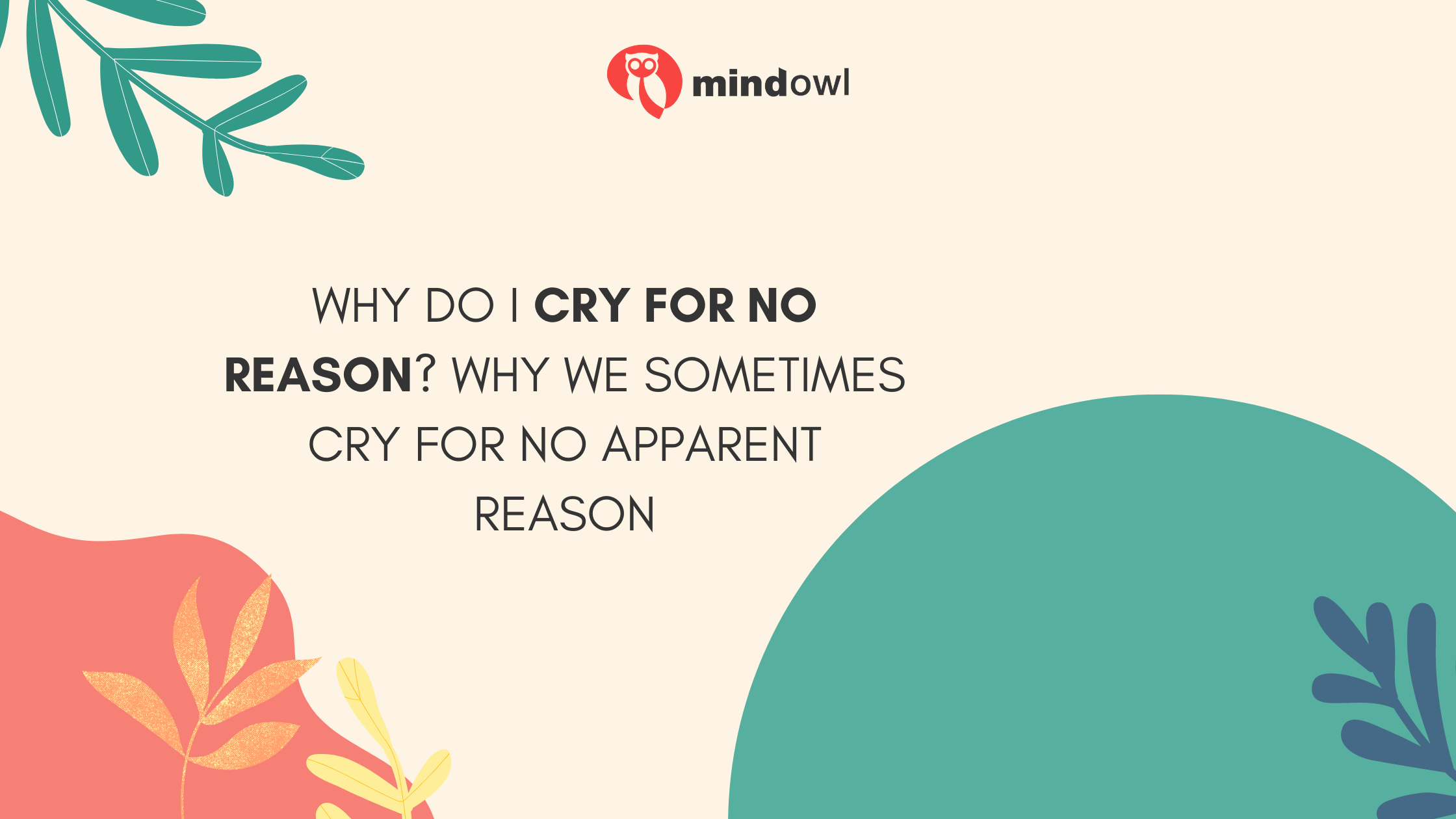Have you ever been going about your day, feeling normal, when suddenly you’re hit with a wave of emotions and tears start welling up in your eyes? You weren’t feeling particularly sad or upset – you were living your life, and then boom, the waterworks start flowing unexpectedly.
If you’ve experienced these seemingly random crying episodes before, you’re not alone. Many people find themselves shedding tears “for no reason” at times. While it can be confusing and even embarrassing when it happens, experts say there are actually several potential causes behind this phenomenon.
From hormonal changes to buried emotions to certain mental health conditions, that spontaneous need to cry usually does have some deeper root causes worth exploring. In this post, we’ll dive into some of the most common reasons why you might tear up out of the blue and what you can do about it.
Key Takeaways
- Crying without a clear reason is common and can be due to mental or physical conditions like depression, anxiety, hormonal imbalances, and more.
- Seeing someone cry or feeling overwhelmed by emotions at night are just two examples of situations that might make us cry unexpectedly.
- If you often find yourself crying for no apparent reason, it’s wise to speak with a therapist or counselor who can offer help and guidance.
- Simple actions such as identifying what triggers your tears, reaching out for support, and practicing relaxation techniques can help manage unexplained crying.
- Understanding that hormones and neurological diseases also play roles in sudden crying spells aids in seeking the right treatment.

Understanding the Phenomenon of Crying for No Reason
Crying for no reason might seem strange, but it’s a common experience for many people. This phenomenon can be linked to several mental or physical conditions. Sometimes, strong emotions like sadness or anger trigger tears without us even noticing.
Other times, something as simple as hormonal imbalances or stress can cause unexpected crying spells. It’s not just about feeling sad; sometimes joy or anger brings on the tears too.
Neuroscientists have found that seeing someone else cry can make us cry too because of how our brains react. Our neurons mimic what we see in others, triggering our emotional response and leading to tears.
Also, at night, some people find themselves crying without a clear reason—this too is part of this complex phenomenon. Whether from psychological issues such as anxiety and depression or physical ones like hormonal changes—a variety of factors can lead someone to cry ‘without reason’.
Potential Causes of Unexplained Crying
Depression
Depression makes people cry more often. It’s a mental health condition that can make you feel very sad, hopeless, and uninterested in life. This sadness isn’t just feeling down; it’s deeper and sticks around longer.
Sometimes, you might find yourself crying without understanding why.
Seeking help from a therapist or mental health professional is vital if depression causes uncontrollable crying. They offer treatment options that can make a big difference. Remember, it’s okay to ask for help when dealing with depression—it shows strength, not weakness.
Anxiety
Anxiety can make you cry for no obvious reason. It builds up stress in your body and mind, leading to emotional overflows. These moments often come without warning. One minute you’re fine; the next, tears start rolling down your cheeks.
This condition is not just about feeling nervous or worried; it deeply affects your mood and can cause physical symptoms too.
Feeling anxious might also trigger frequent crying spells as a way to release built-up tension. People with anxiety disorder often find themselves crying during moments of overwhelming feelings or even when they can’t pinpoint why they feel sad.
Crying becomes one way their body signals that it’s under too much pressure, needing a break from the constant state of high alert anxiety creates.
Burnout
Burnout drains you — mentally, emotionally, and physically. It’s like hitting a wall after running at full speed. You feel tired all the time, your motivation to do even simple tasks vanishes, and everything feels overwhelming.
Often caused by chronic stress from work or personal issues, burnout makes it hard to cope with daily life.
Crying could be a response to this exhaustion. Burnout blurs the lines between work and personal life, leaving little room for relaxation or joy.
Grief
Grief can sneak up on you, catching you off guard. Something small might remind you of a loss, and suddenly, tears start falling. You may cry for seemingly no reason because grief has many layers, each one peeling back over time.
Crying helps process these deep emotions, even if the loss happened long ago.
Understanding grief is key to recognising why you might feel overwhelmed or sad out of the blue. It’s a natural response to losing someone or something important in your life. Crying doesn’t just express sadness; it’s a way to work through complex feelings tied to your memories and attachments.
Hormonal Imbalances
Hormonal imbalances can make you feel like crying for no apparent reason. Changes in hormones affect your mood and emotions. Women often experience this during PMS, pregnancy, and menopause due to dramatic shifts in oestrogen and progesterone levels.
Men are not left out; they too can suffer from hormonal fluctuations that disturb their emotional state.
Dealing with these imbalances is vital for mental well-being. Simple lifestyle changes, exercise, or even medical treatments might help balance things out. Knowing that hormones could be behind your tears helps manage the situation better—no more feeling puzzled over unexpected emotional outbursts.
Pseudobulbar Affect (PBA)
Pseudobulbar Affect (PBA) triggers sudden, uncontrollable episodes of crying or laughing. It often affects people with certain neurological conditions. This can be confusing and embarrassing for those experiencing it.
PBA occurs when brain signals don’t work right due to injury or disease affecting the brain’s emotional control centre.
Understanding PBA is crucial for those who might confuse these outbursts with mood swings or mental health issues. Treatment can help manage symptoms, improving the quality of life for individuals dealing with this condition.
Recognising PBA as a medical issue—not just random crying—encourages seeking professional advice and support.
The Connection between Crying and Mental Health Conditions
Unexplained crying may be linked to mental health conditions such as depression, anxiety, and postnatal depression. Crying without apparent reason is a common symptom of these conditions.
It can also be associated with emotional exhaustion, mood swings, and feeling overwhelmed. Crying for no reason might indicate an underlying emotional issue that needs attention. Moreover, it’s important to recognise unexplained crying as a potential sign of struggling mentally and seek professional help when needed.
Neuroscientists believe that the act of crying releases stress hormones and helps in processing emotions. Furthermore, any strong emotion like sadness or suffering can lead to tears.
This phenomenon could also arise due to a resurfacing of unresolved feelings or grief triggered by reminders of loss from the past.

Medical Causes That May Cause Unexplained Crying
Hormonal Imbalance
Hormonal imbalances may lead to unexplained crying, especially in females. Hormones play a crucial role in regulating emotions, and fluctuations can cause mood swings and tearfulness.
Pre-menstrual syndrome (PMS) is one such example where hormonal changes trigger episodes of crying seemingly for no reason. Additionally, mental and physical exhaustion due to hormonal changes can also result in unexpected bouts of tears.
Crying for no apparent reason may also be linked to the hormonal changes that occur during menopause or postpartum periods. These fluctuations affect brain chemistry and can cause sudden feelings of sadness leading to crying episodes even if there aren’t overt triggers present at that moment.
Neurological Diseases
Neurological diseases can lead to unexplained crying. Certain conditions, such as multiple sclerosis, Parkinson’s disease, or brain tumours, may cause emotional lability and uncontrollable crying due to the impact on the brain’s functioning.
These conditions can disrupt the regulation of emotions and result in sudden outbursts of tears without an apparent trigger. Additionally, neurological diseases like Alzheimer’s may lead to changes in behaviour and cognition that manifest as unexplained episodes of crying.
These diseases affect the brain’s structure and function, potentially causing disruptions in emotional processing and control.
When to Seek Professional Help
If you regularly experience unexplained crying, seek help from a professional therapist or counsellor. If your crying is accompanied by other symptoms of anxiety or depression, it’s important to consider discussing this with a mental health professional for assessment and support.
Coping Strategies for Unexplained Crying
- Identify Triggers: Take note of situations or thoughts that precede the crying episodes.
- Seek Support: Reach out to trusted family and friends for emotional support and understanding.
- Engage in Relaxation Techniques: Practise deep breathing, meditation, or yoga to calm your mind and body.
- Consider Therapy: Seek professional help from a therapist who can guide you in processing emotions and developing coping strategies.
- Maintain a Healthy Lifestyle: Prioritise regular exercise, balanced nutrition, and sufficient sleep to support your mental well-being.
- Express Yourself Creatively: Write in a journal, create art, or engage in hobbies to channel emotions positively.
- Stay Informed: Educate yourself about mental health and seek resources that provide guidance and comfort.
Conclusion
Crying for no reason can be linked to various physical and mental health conditions. Identifying the potential causes is crucial in seeking appropriate help. It’s essential not to dismiss unexplained crying, as it could signify underlying emotional issues that need attention.
Seeking professional help and employing coping strategies can assist in managing this phenomenon effectively. Understanding the complexity of crying for no apparent reason is an important step towards addressing its impact on our well-being.
FAQs
1. Why do I cry for no reason?
Crying for no apparent cause might seem confusing, but it’s a natural response to various unseen stressors or emotional states. It could be your body’s way of telling you to take a closer look at what’s really going on inside.
2. Can crying without reason be a sign of something serious?
Yes, sometimes crying can signal underlying issues, like depression or anxiety. If you find yourself crying uncontrollably and often, it might be time to seek help.
3. Is there any way to stop myself from crying for no reason?
Understanding the possible causes behind your tears is the first step. Once you identify triggers—whether they’re physical, like premenstrual syndrome, or emotional—you can start finding ways to cope.
4. Could my random bouts of crying indicate an underlying medical condition?
Indeed, conditions that affect mood swings and emotional regulation—such as certain neurological conditions—can lead up to unexpected episodes of tears.
5. What should I do if I feel overwhelmed by frequent unexplained crying?
First off, remember it’s okay not to have all the answers right away. Reaching out for professional help can provide clarity and support as you navigate these feelings.
6. How common is it to experience crying with no clear reason?
More common than many think! Many people experience this phenomenon at some point in their lives due to a mix of physical and emotional factors—it doesn’t mean something is “wrong” with you.
MindOwl Founder – My own struggles in life have led me to this path of understanding the human condition. I graduated with a bachelor’s degree in philosophy before completing a master’s degree in psychology at Regent’s University London. I then completed a postgraduate diploma in philosophical counselling before being trained in ACT (Acceptance and commitment therapy).
I’ve spent the last eight years studying the encounter of meditative practices with modern psychology.

